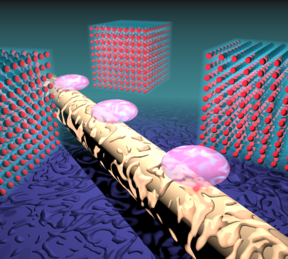Public defence in Engineering Physics, M.Sc. Rouven Alexander Koch
Public defence from the Aalto University School of Science, Department of Applied Physics.

When
Where
Event language(s)
Title of the thesis: Engineering quantum matter with generative machine learning
Opponent: Professor Daniele Passerone, ETH Zurich and EMPA, Switzerland
Custos: Professor Jose Lado, Aalto University School of Science, Department of Applied Physics
Quantum matter is characterized by its exotic properties and that can be the building block for new quantum devices and technologies. It offers a fascinating landscape of materials and phenomena that includes for example superconductors and topological insulators. These materials show behaviors that are rare in natural compounds, making them both intriguing and challenging to study. The complexity of these condensed matter systems requires sophisticated approaches to understand and characterize their unique properties. Despite significant progress in computational techniques and experimental methods the field still faces significant challenges and overcoming these complexities requires continuous development of new methodologies.
This thesis explores the intersection of condensed matter theory, quantum matter, and artificial intelligence (AI). By leveraging the power of machine learning (ML), particularly generative ML techniques, we aim to tackle some of the most intricate problems in quantum many-body physics. The importance of ML in scientific research, especially in physics, is growing rapidly due to the success of modern AI research. Technologies like generative adversarial networks (GANs) and large language models (such as ChatGPT) have transformed various research fields by offering new capabilities, from creating realistic images to generating coherent text. In this work, we use these generative ML methods to enhance our simulation methods for quantum matter, uncover hidden parameters in complex quantum systems from data, and automate the control of quantum devices and experiments including setups like the Kitaev chain. This approach helps bridge the gap between theoretical and experimental physics.
Our research explores a new way to tackle some of the biggest challenges in understanding and calculating complex quantum systems using a combination of artificial intelligence and condensed matter physics. We are developing innovative methods to design exotic quantum phenomena, making a significant step toward future technological advancements in quantum technology, materials science, and quantum computing. By blending advanced ML techniques with traditional physics approaches, we aim to lay the foundations for new discoveries and applications in quantum science.
Keywords: Correlated quantum materials, generative machine learning, quantum many-body physics
Thesis available for public display 10 days prior to the defence at: https://aaltodoc.aalto.fi/doc_public/eonly/riiputus/
Contact information:
| rouven.koch@aalto.fi | |
| Mobile | +4915788194194 |
Doctoral theses at the School of Science: https://aaltodoc.aalto.fi/handle/123456789/52






